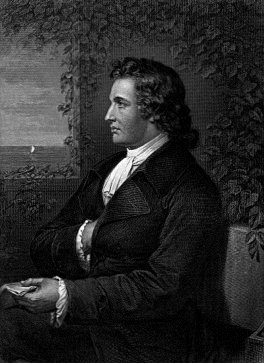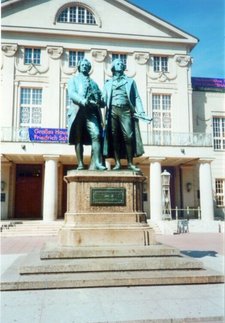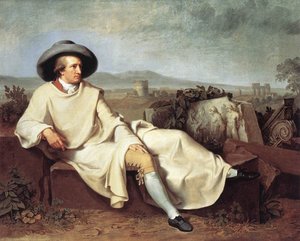Johann Wolfgang von Goethe
|
|
Johann Wolfgang von Goethe (pronounced ['gø tə]) (August 28, 1749 – March 22, 1832) was a German writer, politician, humanist, scientist, and philosopher. As a brilliant writer, Goethe was one of the paramount figures of German literature and European Romanticism during and around the 18th and 19th century. Goethe was the author of Faust and Theory of Colours and inspired Darwin with his independent discovery of the human premaxilla jaw bones.
| Contents |
Life
Goethe was born in Frankfurt am Main, Germany. His father was a man of means and position, who personally supervised the early education of his son. The young Goethe studied at the universities of Leipzig and Strasbourg, and in 1772 entered upon the practice of law at Wetzlar. At the invitation of Karl August, Duke of Saxe-Weimar, he went in 1775 to live in Weimar, where he held a succession of political offices, becoming the Duke's chief adviser. From 1786 to 1788 he traveled in Italy, and directed the ducal theater at Weimar. He took part in the Napoleonic wars against France, and in the following began a friendship with Friedrich Schiller, which lasted till the latter's death in 1805. In 1806 he married Christiane Vulpius. As of 1820 he was on friendly terms with Kaspar Maria von Sternberg. From about 1794, he devoted himself chiefly to literature, and after a life of extraordinary productiveness, died in Weimar.
Works
The most important of Goethe's works produced before he went to Weimar were his tragedy Götz von Berlichingen (1773), which was the first work to bring him fame, and the novel The Sorrows of Young Werther, influenced by James Macpherson's Ossian, which gained enormous popularity during the so-called Sturm und Drang period. During the years at Weimar before he met Schiller he began Wilhelm Meister, wrote the dramas Iphigenie, Egmont, and Torquato Tasso, and his Reineke Fuchs.
To the period of his friendship with Schiller belong the continuation of Wilhelm Meister, the beautiful idyl of Hermann and Dorothea, and the Roman Elegies. In the last period, between Schiller's death, in 1805, and his own, appeared Faust, Elective Affinities, his autobiographical Dichtung und Wahrheit (Poetry and Truth), his Italian Journey, much scientific work, and a series of treatises on German art.
In addition to his literary work, Goethe also contributed significant work to the sciences. In biology: his theory of plant metamorphosis stipulated that all plant formation stems from a modification of the Leaf. He is also known for his discovery of the intermaxillary bone in humans. He considered his Theory of Colours to be his most important contribution to science.
Historical Importance
It is difficult to overstate the importance of Goethe on the 19th century in this era. In many respects, he was the originator of – or at least the first to cogently express – many ideas which would, in time, become familiar. Goethe produced volumes of poetry, essays, criticism, and scientific work, including a theory of optics and early work on evolution and linguistics. He was fascinated by minerals and early mineralogy (the mineral goethite is named for him). As a philosopher and writer he is one of the key figures in the transition from the Enlightenment to Romanticism.
The following list of key works may give a sense of the scope of the impact his work had on his and our time.
The short epistolary novel, Die Leiden des jungen Werther, or The Sorrows of Young Werther, published in 1774 recounts an unhappy love affair that ends in suicide. Goethe admitted that he "shot his hero to save himself". The novel remains in print in dozens of languages and is referenced frequently in the context of the young disaffected and moody hero — a Romeo figure. However, the form of the novel, and the ending in death, were not uncommon in the day. It was the untrammeled expression of longing for the unattainable which made it controversial, and also a model for other novels and works.
The next work, his epic closet drama Faust, was to be completed in stages, and only published in its entirety after Goethe's death. The first part was published in 1808 and created a sensation. The first operatic version, by Spohr, appeared in 1814, and was subsequently the inspiration for operas by Gounod, Boito and Busoni, as well as symphonies by Liszt and Mahler. Faust became the ur-myth of many figures in the 19th century. The basic plot of "selling one's soul to the devil" for power over the physical world took on increasing importance and became a metaphor for the victory of technology and industrialism and its human cost.
Goethe's poetic work served as a model for an entire movement in German poetry termed Innerlichkeit (introversion) and represented by, for example, Heine. Goethe's words inspired a number of compositions by, among others, Mozart, Beethoven, Schubert, Berlioz and Wolf. Perhaps the single most influential piece is "Mignon's Song" which opens with what has been called the most famous line in German poetry: "Kennst du das Land, wo die Zitronen blühn?" ("Do you know the land where the lemons bloom?")
He was also widely quoted. Epigrams such as "Against criticism a man can neither protest nor defend himself; he must act in spite of it, and then it will gradually yield to him." and "Divide and rule, a sound motto; unite and lead, a better one" and "Enjoy when you can, and endure when you must" are still in usage or are paraphrased. Lines from "Faust", like "Das also war des Pudels Kern", "Das ist der Weisheit letzter Schluss" or "Grau ist alle Theorie" have entered everyday German usage. Although a doubtful success of Goethe in this field, the famous line from the drama "Götz von Berlichingen" ("Er kann mich im Arsche lecken" — "He can lick my arse") has become a vulgar idiom in many languages and shows Goethe's deep cultural impact extending across social, national and linguistic borders. It may be taken as another measure of his fame that other well-known quotations, like Hippocrates' "Art is long, life is short", are often erroneously attributed to Goethe.
Goethe's influence was dramatic because he understood that there was a transition in European sensibilities, an increasing focus on sense, on the indescribable and the emotional. This is not to say that he was emotionalist or excessive; quite the contrary: he lauded personal restraint and felt that excess was a disease. "There is nothing worse than imagination without taste." He argued that law developed out of the depth of a people's culture and their connectedness to the land they live on, and therefore rational laws could not be imposed effectively from above: an interpretation that placed him in direct opposition to those who attempted to form "enlightened" monarchies based on "rational" laws, for example Joseph II of Austria or, later, Napoleon as emperor of France.
This change would, in time, become the basis for 19th century thought — organic rather than geometrical, evolving rather than created, and based on sensibility and intuition, rather than on imposed order. This makes him, along with Adam Smith, Thomas Jefferson, and Ludwig van Beethoven a figure in both worlds. On one hand, devoted to the sense of taste, order and finely crafted detail which is the hallmark of the artistic sense of the Age of Reason and the neo-classical period of architecture, and on the other, seeking a personal, intuitive and personalized form of expression and polity, and believing firmly in self-regulating and organic systems. Thinkers such as Ralph Waldo Emerson would take up many of the same ideas in the 1800's. His ideas on evolution would frame the question which Darwin and Wallace would approach within the scientific paradigm.
List of Works
Novels
- (1774) Die Leiden des jungen Werther (The Sorrows of Young Werther)
- (1796) Wilhelm Meisters Lehrjahre (Wilhelm Meister's Apprenticeship)
- (1809) Die Wahlverwandschaften (Elective Affinities)
- (1821) Wilhelm Meisters Wanderjahre (Wilhelm Meister's Travels)
Dramas
- (1773) Götz von Berlichingen
- (1787) Iphigenie auf Tauris (Iphigenia in Tauris)
- (1788) Egmont
- (1790) Torquato Tasso
- (1808) Faust Part 1
- (1832) Faust Part 2
Poems
- (1773) Prometheus [1] (http://www.ffrf.org/day/?day=28&month=8)
- (1782) Der Erlkönig (The Erl King)
- (1790) Römische Elegien (Roman Elegies)
- (1794) Reineke Fuchs
- (1797) Der Zauberlehrling (The Sorcerer's Apprentice)
- (1798) Hermann und Dorothea (Hermann and Dorothea)
Nonfiction
- (1790) Versuch die Metamorphose der Pflanzen zu erklären (The Metamorphosis of Plants), scientific text
- (1810) Zur Farbenlehre (Theory of Colors), scientific text
- (1811-33) Aus meinem Leben. Dichtung und Wahrheit (From my life. Poetry and Truth), autobiographic poetry
- (1817) Italienische Reise (Italian journey)
Quotes
- Things that matter most must never be at the mercy of things that matter least.
- You must be either the servant or the master, the hammer or the anvil.
- Know thyself? If I knew myself, I'd run away.
- When ideas fail, words come in very handy.
- Men err as long as they strive.
- There are two things children should get from their parents: roots and wings.
- Everything is simpler than you think and at the same time more complex than you imagine.
- We are shaped and fashioned by what we love.
See Also
External links
- Weimar Classics Foundation (http://www.weimar-klassik.de/english.html) (includes the National Goethe Museum and the Goethe and Schiller Archive)
- Template:Gutenberg author (English translations and German originals)
- Johann Wolfgang von Goethe's works (http://projekt.gutenberg.de/autoren/goethe.htm) at Projekt Gutenberg-DE (in German)
- Goethe and giving style to one's character (http://www.centrebouddhisteparis.org/En_Anglais/Sangharakshita_en_anglais/Giving_style_to_one_s_characte/giving_style_to_one_s_characte.html)
Template:Wikiquotear:يوهان فولفغانغ فون غوته bg:Йохан Волфганг фон Гьоте ca:Johann Wolfgang Von Goethe cs:Johann Wolfgang von Goethe da:Johann Wolfgang von Goethe de:Johann Wolfgang von Goethe als:Johann Wolfgang von Goethe es:Johann Wolfgang von Goethe eo:Johann Wolfgang VON GOETHE fr:Johann Wolfgang von Goethe ko:괴테 it:Johann Wolfgang von Goethe he:יוהן וולפגנג פון גתה ka:გოეთე, იოჰან ვოლფგანგ lb:Johann Wolfgang von Goethe lt:Johanas Volfgangas Gėtė mk:Јохан Волфганг фон Гете hu:Johann Wolfgang Goethe nl:Johann Wolfgang von Goethe ja:ヨハン・ヴォルフガング・フォン・ゲーテ no:Johann Wolfgang von Goethe pl:Johann Wolfgang von Goethe pt:Goethe ro:Johann Wolfgang von Goethe ru:Гёте, Иоганн Вольфганг scn:Johann Wolfgang von Goethe simple:Johann Wolfgang von Goethe sk:Johann Wolfgang von Goethe sl:Johann Wolfgang von Goethe fi:Goethe sv:Johann Wolfgang von Goethe zh:歌德



